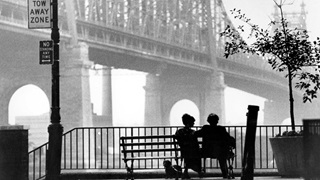
The moving image
If his life were a movie, this is how Attilio Pavone's would play out | Issue 21 | 2022


When I was growing up in Iceland, the cinema was a collectively social arena. No one cared what time the movie started; they would go to the theater at any time, a gaggle of friends in tow, smoking, talking loudly, circulating through the theater to see who else was there. In Canada, the experience was structured and silent: eyes front, hands on knees, no talking, and certainly no smoking. It was in these dimly lit (sometimes poorly ventilated) rooms that I fell in love not only with film, but popular film: blockbusters, horror movies, science fiction. I am drawn to the trashy and the terrible—things that other people might not bother with, I do want to bother with.
Quentin Tarantino and Spike Lee are always talking about their craft and their role in that discourse. I’ve never been particularly interested in what they have to say—although Spike Lee is a fabulous director. Tarantino is more hit-and-miss; I certainly didn’t enjoy his last few movies. But Spike Lee is a great film-maker. He has taken a cinéma vérité approach to race relations in the United States that is uncomfortable for a lot of people to confront. But I still don’t need him to explain his films to me.
I think I have an aversion to the intellectual, to some degree. I’ve probably seen The Good The Bad and The Ugly forty times; I’ve seen Jaws forty times; these are movies I have consumed over and over again. Ridley Scott’s Alien is another. I find them fun to interrogate. They are not perfect cultural vehicles by any means, but they are imperfect in ways that I find interesting. I would say I enjoy them more than a lot of arthouse cinema. That’s maybe my own stubbornness. Sometimes the things that I like the most are the things that others turn their noses up at.
Jordan Peele’s Get Out is exactly the kind of movie that I love—it’s a horror movie that is utterly engaged with the political and the social.
Zombie movies are all about the cultural Zeitgeist. I think it’s Dawn of the Dead that has this great scene of zombies wandering through a mall and going up and down escalators—all these mindless beings wandering around, consuming. Some movies are too self aware, and that spoils the illusion for me. Shaun of the Dead is the exception to my rule of not being too self aware.
Shaun of the Dead
dir. Edgar Wright [2004]
It’s a fun movie. It’s the ultimate zombie movie. It takes the two main characters so long to realise that they’re in a zombie apocalypse: it’s all happening around them and they’re totally unaware. I love it. It’s the perfect zombie movie.
Moana
dir. Ron Clements, John Musker, Don Hall [2016]
The Disney movie Moana is definitely fun to see with kids. But there is this creepy moment in it where the Chief says: “We have this island and we all have our role on the island and no one ever leaves”. What a horrifying idea.
There are a lot of bad movies out there. The new Star Wars movies are all terrible. Many of the Marvel movies are terrible. But then, they’re not really for me as an audience.
The Cabin in the Woods is a movie that is too self aware for its own good. I laughed along with it to a certain degree while I was watching it, but it’s much less sophisticated as a horror movie product than something like Get Out.
The Matrix is a fascinating example of trashy science fiction that is interesting but that ultimately fails.
The Matrix Trilogy
dir. Lana and Lilly Wachowski [1999, 2003]
I was compelled by the first film in the Matrix trilogy. There is a scene in the opening where Neo retrieves a book from his shelf which turns out to be a hollowed-out hiding place for contraband. The book—you have to be eagle-eyed to spot it—is called Simulacra and Simulations. Its author, Jean Baudrillard, was a French sociologist who wrote that our media environment constructs a perceived reality that dominates our lived experience to the point where it has become a simulation. In the world of The Matrix, ‘reality’ is a grayish hellscape, devoid of physical or carnal pleasure; only the simulation can provide happiness. But happiness, we discover, is not the goal. The goal is to dismantle the simulation and restore humanity’s connection to the real, as unhappy and undesirable as that might be. It turns out that the simulation can only be dismantled from inside, by invading it, understanding its mechanisms, and replicating them within oneself.
The two sequels accomplished something I thought no sequel could do: they made the original worse. They took away its mystery by uncomplicating everything about it. They made it into a simple action movie: defeat the villain, be a kung-fu hero, all of that stuff. The result is boring and heavy-handed. Neo becomes the messiah of humanity in a biblical war against a technological bogeyman. Dreadful. You cannot watch the original again after watching the sequels.
Objectively, The Thing is not a good—or even particularly watchable—movie. Kurt Russell chews the scenery, the special effects are campy, and (to my daughter’s horror) the dog dies. But I love it anyway.
The Thing
dir. John Carpenter [1982]
The Thing is animated by the fascinating (if common) motif of the ‘secret-alien-invader-who-could-be-one-of-us’. Released during the waning years of the Cold War against the backdrop of a collective fear of the Soviet threat, it is in a way timeless. I watched The Thing again during the lonely heights of the global pandemic and found it to have a new and trenchant significance: the unseen, alien danger lurks inside ordinary people, even people we know.
Jaws is is the ultimate movie that fails in interesting ways. It is, of course, not a blockbuster. It is the blockbuster: the first movie to be described with that term. It’s a term that is still in use today, though the spectacle of lines of people rounding whole city blocks is an atavism of a history when movie theaters were all located in the city.
Jaws
dir. Steven Spielberg [1975]
As a ‘monster movie’, Jaws fails completely: the shark (nicknamed Bruce by its fans) is an animatronic monstrosity that frightens more effectively when off screen. The filming was an infamous fiasco, beset with sometimes dangerous technical challenges as the first film shot on the ocean. Spielberg emerges as an unintentional virtuoso. Forced to abandon the idea of the monster movie, he pivots and allows the characters to drive the story. The result is a story that is about a shark in much the same way that Moby-Dick is about a whale.
The shark looms as an ever-threatening presence in the ocean, heralded by John Williams’ aquatically eerie score—without which, this film would have utterly failed. Into this environment, Spielberg brings together a Melvillean set of characters: a traumatized sea captain (shades of Ahab), a marine biologist, and a transplanted cop from New York City who is terrified of water but inexplicably moved to an island.
But—spoiler alert!—the shark cannot remain off screen forever. Eventually it must return, animate the ocean’s mute threat against this island town, and be destroyed. This occurs in an almost heavy-handed allusion to Moby-Dick, ramming the heroes’ ship and ultimately sinking it. Jaws ends, as in Melville’s tale, with its hero clinging to driftwood, drifting away from the wreckage of the captain’s doomed ship. Yet the ending is also very unlike Moby-Dick and therefore not satisfying: where Ahab’s ‘white whale’ returns to the deep (undefeated and victorious), Spielberg’s shark is consumed in a bloody and explosive conflagration. Human technology triumphs over nature.
The sequels are not worth watching. They’re just bad movies.
Big Night
dir. Campbell Scott and Stanley Tucci [1996]
I really liked Big Night when it came out—and it made me a into a huge fan of Stanley Tucci. I haven’t seen Supernova yet (another Tucci film), but I want to.
Romantic comedies don’t seem to stick with me in the way other films do. I liked 10 Things I Hate About You and I liked Clueless, but I suspect that had more to do with the source material: the best romcoms are sort of Shakespearean. Kenneth Branagh’s Much Ado About Nothing is a lot of fun.
Pretty Woman
dir. Garry Marshall [1990]
Pretty Woman is a good example of a romcom that has aged poorly. It was very popular at the time, and now it is clearly a problematic movie. It’s one you want to have a dialogue with, but can you? Can it be saved through discourse or is it one we need to put in the trash bin?
This early Coen brothers vehicle is a mostly lighthearted take on the life of the worker at the height of industrial capitalism.
The Hudsucker Proxy
dir. Coen brothers [1994]
The film narrates the rise and fall of Norville Barnes (Tim Robbins), whose wide-eyed innocence in the face of a corporate machine that threatens to consume him gives the movie its unique mood—which manages to straddle the silly and the trenchant. Norville’s ‘big idea’ is a circle (‘you know: for kids’) which stands at times for the hula hoop or the frisbee or the straw. The plot is also circular. By the end, we understand the central truth of the corporate grind: anyone can make it to the top; but only as a cog in a wheel; and that wheel keeps on turning; so, soon enough, you find yourself at the bottom, again.
The Hudsucker Proxy may not be a classic in its own right, but it is rooted in a filmic tradition that includes Orson Welles’ Citizen Kane (1941) and Modern Times, Charlie Chaplin’s last and perhaps his finest film.
Modern Times
dir. Charlie Chaplin [1936]
Modern Times is the classic send-up of modern industrial culture. Chaplin’s iconic ‘little tramp’ finds himself in need of work and takes a job on an assembly line, where he becomes mute and faceless and in the end is—literally—consumed by the factory’s cogs and wheels. His only escape is to return to his former life as a little tramp, no less hungry or in need, but perhaps a bit wiser about attempting to fit into a world that has passed him by.
In 1920, Paul Klee painted his Angelus Novus, a crudely sketched angel with wings outstretched and a curiously impassive expression. Walter Benjamin called it 'the angel of history': it looks out over the entire arc of history but is helpless to alter its course.
In his 1969 Theses on the Philosophy of History, Benjamin writes:
“a storm is blowing from Paradise; it has got caught in his wings with such violence that the angel can no longer close them. The storm irresistibly propels him into the future to which his back is turned, while the pile of debris before him grows skyward. This storm is what we call progress.”
I think of Klee's angel of history as of a kind with Chaplin’s little tramp. Both are metaphors for our own experience of culture, progress, and constant, inevitable change.
My son is ten. The other day, he shared his career objective with me: he is going to get really good at chess and then stream himself playing chess on Twitch; people will watch it and pay him money. We live in a very rapidly changing cultural world and it’s hard to keep up with it.
I wonder about the future of the cinema. I don’t mean the future of film—the medium is not going anywhere. It has evolved, become more digital, ‘on demand’. But the physical act of going to the cinema seems to me to be on the decline. I’m on the younger side of generation X, so I can recall the shift from cinema to cineplex, as well as the emergence and rapid obsolescence of Betamax, VHS, Laserdisc, DVD, and Blu-Ray. But that peculiarly distinctive experience of cinema—that collective act of viewing; and being viewed, viewing—is lost by watching The Thing on a fingerprint-smeared tablet. In the past, even if I went on my own, I still watched the movie in the company of dozens of strangers. The experience was not solitary but collective. After the movie ended, we all filed out together, passing queues of people waiting in line to see the next showing; and in that instant we became part of a subculture, with an unspoken, almost holy pact of silence: Don’t tell anyone that Darth Vader is Luke Skywalker’s father; that Jaye Davidson’s character is transgender; that Bruce Willis is dead. The act of cinema-going was viewed as somehow sacred: not to be ‘spoiled’.
In the digital age there can be no secrets. Even before a film or television serial is released, the internet writhes with reddits, subreddits, and buzzfeeds that warn the reader: spoiler alert! This warning is not really meant to be heeded: we are virtually helpless to turn away, and anyway there is a kind of breathless joy in this spoilage.

If his life were a movie, this is how Attilio Pavone's would play out | Issue 21 | 2022

Mathieu Dahan on The Killing of a Chinese Bookie, Woody Allen, and Netflix | Issue 14 | 2018
© Norton Rose Fulbright US LLP 2025